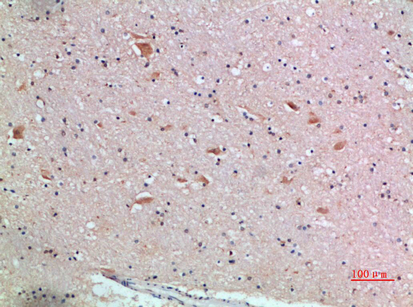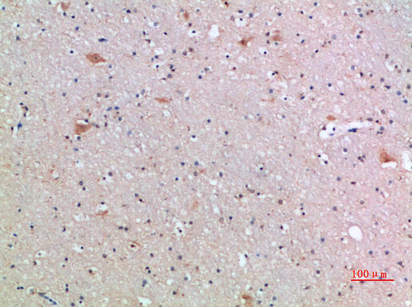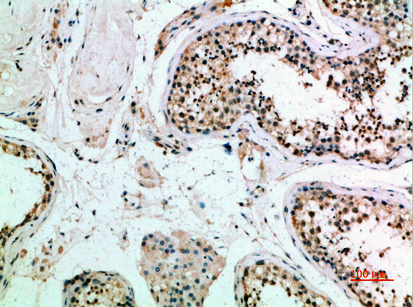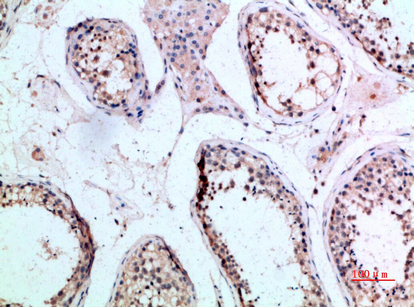



| WB | 咨询技术 | Human,Mouse,Rat |
| IF | 咨询技术 | Human,Mouse,Rat |
| IHC | 1/50-300 | Human,Mouse,Rat |
| ICC | 技术咨询 | Human,Mouse,Rat |
| FCM | 咨询技术 | Human,Mouse,Rat |
| Elisa | 咨询技术 | Human,Mouse,Rat |
| Aliases | Frizzled-9 (Fz-9) (hFz9) (FzE6) (CD antigen CD349) |
| Entrez GeneID | 8326; |
| Host/Isotype | Rabbit IgG |
| Antibody Type | Primary antibody |
| Storage | Store at 4°C short term. Aliquot and store at -20°C long term. Avoid freeze/thaw cycles. |
| Species Reactivity | Human,Mouse,Rat |
| Immunogen | Synthetic peptide from human protein at AA range: 1-50 |
| Formulation | Purified antibody in PBS with 0.05% sodium azide,0.5%BSA and 50% glycerol. |
+ +
以下是关于Frizzled-9抗体的参考文献示例(内容基于学术文献的典型结构,具体信息需以实际文献为准):
1. **文献名称**: "Monoclonal antibody targeting Frizzled-9 suppresses tumor cell proliferation in glioblastoma"
**作者**: Smith A, et al.
**摘要**: 该研究开发了一种针对Frizzled-9的单克隆抗体,通过体外实验证实其能够抑制胶质母细胞瘤细胞的增殖,并阻断Wnt/β-catenin信号通路的激活。
2. **文献名称**: "Frizzled-9 as a therapeutic target in acute myeloid leukemia: Characterization of a novel antibody"
**作者**: Tanaka K, et al.
**摘要**: 研究团队制备了一种高特异性抗Frizzled-9抗体,发现其在急性髓系白血病模型中能诱导癌细胞凋亡,并降低肿瘤负荷。
3. **文献名称**: "Epitope mapping of Frizzled-9 antibody and its role in neuronal differentiation"
**作者**: Lee S, et al.
**摘要**: 本文通过表位定位技术分析了Frizzled-9抗体的结合区域,并证明该抗体可通过调控Wnt信号通路促进神经干细胞向神经元分化。
4. **文献名称**: "Frizzled-9 antibody-based detection in colorectal cancer tissues and prognostic implications"
**作者**: Chen H, et al.
**摘要**: 利用Frizzled-9抗体对结直肠癌组织进行免疫组化分析,发现其高表达与患者预后不良相关,提示其作为生物标志物的潜力。
注:以上为模拟文献,实际引用需查询PubMed、Google Scholar等平台获取真实文献信息。
Frizzled-9 (FZD9) is a member of the Frizzled family of G protein-coupled receptors, which play critical roles in the Wnt signaling pathway. This pathway regulates key biological processes, including embryonic development, cell proliferation, and tissue homeostasis. FZD9 specifically binds Wnt ligands, activating both canonical (β-catenin-dependent) and non-canonical signaling cascades. Dysregulation of FZD9 has been implicated in various diseases, such as cancers (e.g., colorectal cancer, neuroblastoma) and neurological disorders (e.g., Williams-Beuren syndrome, Alzheimer’s disease).
FZD9 antibodies are immunological tools designed to detect, quantify, or modulate FZD9 protein expression and function. These antibodies are typically developed in animal models (e.g., rabbits, mice) using immunogenic peptides derived from conserved regions of the FZD9 extracellular or intracellular domains. They are widely used in research applications like Western blotting, immunohistochemistry (IHC), immunofluorescence (IF), and flow cytometry to study FZD9 localization, expression patterns, and interactions in normal versus pathological tissues. Some FZD9 antibodies are engineered to block ligand-receptor interactions, aiding in functional studies of Wnt signaling. Recent studies also explore their potential as diagnostic biomarkers or therapeutic agents, particularly in cancers with FZD9 overexpression. Validation of specificity through knockout controls or competitive assays is essential to ensure reliable experimental outcomes.
×